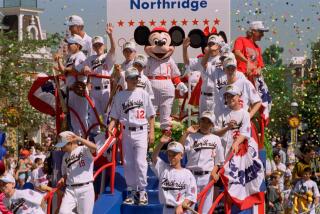Imported Heat : Ailing Sport of Fast-Pitch Softball Gets a Shot in the Arm From New Zealand Hurlers, Like This Long Beach Ace
- Share via
LONG BEACH — The intent of this tall chap with the dark mustache and pale blue eyes was to keep the hitters from, as he put it, “driving the ball out of the yard.” He was from New Zealand, of course. That was evident in his voice and in his right arm, which threw a softball like few Americans can anymore. And the hitters, recognizing Alan Wishart out on the brick-dust mound, would be fortunate to clear the infield, let alone the yard.
Wishart is the ace pitcher of the Long Beach Nitehawks, who played Burbank Raymax in a Western Softball Congress game Saturday evening before a hundred or so die-hard fans at Joe Rodgers Field.
This was fast -pitch, which had its day decades ago when in every town there were outstanding pitchers, men with windmill windups and crew cuts whose pitches were as quick and darting as the bugs atop the light towers. And people, who had no television to keep them home, came out with lawn chairs and watched.
The sport thrived until the windmills got old and creaky and finally disappeared. Young replacements were not to be found, and fast-pitch, without players in its most skilled position, ground almost to a halt.
And then New Zealand and its wealth of pitching talent was discovered by U. S. teams that toured there in the early 1970s. The pitchers were easily cajoled--with offers of paid expenses and jobs--into “coming across” to help maybe win a world championship.
Sport Barely Alive
The pitchers, including Wishart, came and have kept the sport alive, albeit barely.
Wishart, who said he is one of about 24 New Zealand pitchers in the United States, talked about his roots in a country where softball is as popular as baseball is here.
“The place where I lived (in Wellington) had a park at the end of the street and there was a team playing down there,” he said before warming up Saturday. “As a kid, I used to wander down there and watch. I thought I’d like to play that game. I decided that pitching looked to be the main part of the game, so I decided that’s what I’d try and do.
“We didn’t have pitching clinics or anything. Each kid just kind of watched and picked up a ball and tried. That’s still, I’m sure, pretty much the way it happens. I’ve developed as I’ve gone along, obviously, but I never found it a problem to start with. It just seemed to come naturally for me.”
Only girl fast-pitch pitchers are born in America anymore. High schools have softball teams, but not for boys.
“Guys here play baseball and they get a late jump making the transition to this game,” Wishart said. “They are 21, 22 before they start thinking about pitching softball and probably the only reason they think about it then is because they can’t go any further in baseball.”
Many softball players prefer the slow-pitch game, which is looked upon with disdain by fast-pitch players.
“In slow-pitch you don’t have to be that talented a player, anyone can hit in slow-pitch,” Wishart said. “This is a lot closer to the schools of baseball. You’ve got a person out on the mound with a ball in his hand challenging you.”
Wishart, 34, first came to America in 1976 when a team in Phoenix recruited him.
“I pretty much decided to make the trip to see what it was like,” said Wishart, who was an established star in New Zealand, having played on four national champion teams.
“Originally I came here just to play ball,” he said. “That’s all I wanted to do. I’d play six months here (in Arizona), then go back home and play. It was like going away for a six-month vacation. It was fun, just sit around, swim, do all the good things in life and go out and play ball.”
After the 1982 season, Wishart, a college graduate, came to California looking for as job because the import-export company he had worked for in Phoenix had closed.
“When the Nitehawks realized I was going to be coming here, they asked me if I’d play for them,” Wishart said.
World-Class Power
The Nitehawks, 12-4 this season, have been a world-class softball power for decades. You stay one by getting a pitcher from New Zealand.
A longtime Nitehawks supporter, Al Blas, president of Orange Manufacturing Co. of Placentia, a division of U-Haul, got Wishart a job as a buyer with his company.
“It was a great move,” said Red Meairs, the 63-year-old Nitehawks’ owner, as he spit tobacco juice into a cup. “He’s one of the best around. He’s got a good raise, drop and change.”
Wishart, who lives in Long Beach and has established permanent residency in the United States, is now in his fourth season with the Nitehawks.
“I’m completely self-sufficient now,” he said. Neither he nor his Nitehawk teammates get paid for playing, but their expenses are usually taken care of when they attend tournaments.
It was 6:30, a half hour before game time, and Wishart was studying the Burbank players who were taking batting practice.
“I’ll go out and give it the best I’ve got tonight,” Wishart said. “I know only one way to play--to win. If I lose the desire to want to win more than anything else in the world, then I will call it a day.”
About the only thing he’s lost is a little speed off his fastball, which he blames on advancing age.
“I can probably muster a couple of pitches right up there (85 m.p.h.-plus) with the best of them, but I cannot sustain it anymore,” Wishart said. “I just cannot throw seven innings of ball like a 25-year-old kid can. Because I can’t blow the ball past people too much anymore; I try to hit locations, move the ball up and down.”
Wishart warmed up, his right arm circling effortlessly, and the ball shot from his hand as if from a cannon.
Watching was Bob Todd, one of the Nitehawks’ all-time top pitchers and now the team’s pitching coach. “Throwing hard is a God-given thing,” Todd said.
Wishart was breezing and blowing the ball past people the way he did when he was 25. Whoooosh . A Burbank batter swung and missed as the ball rose dramatically and shot into catcher Nick Hopkins’ glove. Pop . At 6 feet, 5 inches tall and only 46 feet from home plate, Wishart, wearing a red shirt, seemed on top of the batters.
In the twilight, some of the fans sat in the stands, others in lawn chairs, like in the old days, and they kept up a banter. “ . . . You’ve got to be right on one of ‘em, ump. They were in the same spot. . . . Hang out another rope, Freddie. . . . Foot outside ump. Hey ump, get help.”
“This is almost gone,” said Bob Guy, 70, talking about fast-pitch as he sat in the front row behind the green backstop.
Guy’s friend, Ray Hutto, 63, of Lakewood put in his two cents about Wishart: “Hell of a nice guy, I know him personally. I follow this team.”
Long Beach led, 1-0, late in the game but Hutto warned: “This game’s not in the bag yet. They got some good sticks coming up.”
Burbank rallied in the top of the seventh inning. “C’mon, Wish,” old Red Meairs yelled from the dugout, chewing and spitting.
Wishart hit a batter, who then stole second base and went to third when the throw from Hopkins went into center field. Meairs shook his head.
Wishart tried to bear down. He had a ball and two strikes on the next batter, Kevin Anderson. Hopkins signaled for a riser. Wishart knew that was not the pitch for the situation. He knew he should throw a drop and avoid a possible fly ball that could score the guy on third. He threw the riser anyway.
Before his grunt could evaporate into the black sky, the smack of bat against ball rang out alarmingly. A line drive to center field. Tie game.
In the dugout, Meairs rattled off encouragement in words run together without breaths in between: “Hey-Alan-let’s-get-’em-and-get-in-and-get-some.”
Wishart got the next two batters and returned to the dugout. “Damn,” he yelled and threw his glove down and rammed his hands against the chain-link fence. To Hopkins, he said, “I should have shook you off on that pitch.”
The game went into extra innings. Long Beach won, 2-1, in the last of the eighth on a single by Fred Luera. Wishart was the winner, improving his record to 7-2.
But it wasn’t the ensuing celebration that stood out most that night.
It was the sight of Wishart sitting alone in the grandstand, where he had retreated briefly after giving up the tying run, smoking a cigarette, smoldering because he had almost blown a chance to win, which he still wants to do more than anything else in the world.
More to Read
Go beyond the scoreboard
Get the latest on L.A.'s teams in the daily Sports Report newsletter.
You may occasionally receive promotional content from the Los Angeles Times.










